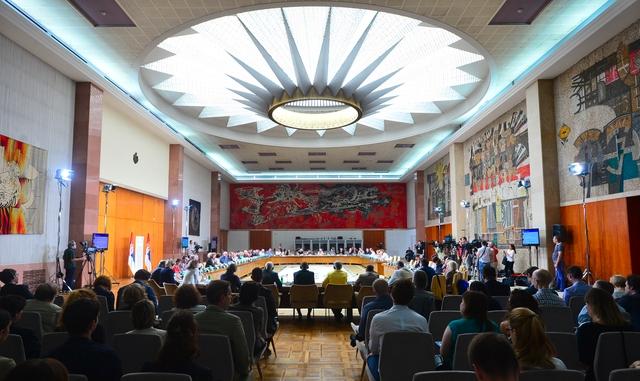Public debate on ombudsman's report, state of civil rights
The state of civil rights in Serbia in 2015 was marked by economic woes of a large number of citizens and a lack of legal security.
Wednesday, 22.06.2016.
12:01

Public debate on ombudsman's report, state of civil rights
Ombudsman Sasa Jankovic said that the number of complaints rose by 28 percent and that it could be said that "the ordinary citizen" was the most vulnerable.At the beginning of the debate on Tuesday, Jankovic pointed out that the Serbian Assembly for two years failed to consider his reports, although this is a legal requirement.
He added that he "dared say" that the institution he heads was fulfilling its role to control the authorities, and noted that the situation was still not satisfactory, although 88 percent of all of recommendations have been implemented.
"Particularly vulnerable groups are the extremely poor citizens, children, youth, internally displaced persons, victims of domestic violence, organizations and individuals who advocate for human rights, journalists, members of the LGBT community," Jankovic said.
Speaking about the position of independent regulatory authorities within the state organization, in normative and practical terms, Commissioner for Information of Public Importance Rodoljub Sabic said there was "a gap between the normative and the real," but noted that "some things changed for the better, such as work conditions."
"But a constant problem remains the question of the stance of other parts of the system of government toward these institutions," Sabic said, adding that on the other hand, citizens understand their importance.
Due to the lack of understanding so far, he added, the results have not been "appropriate."
Commissioner for Equality Brankica Jankovic confirmed that a majority of complaints concerned the endangering of social and economic rights, while the president of the Association of Judges of Serbia, Dragana Boljevic, cited inefficiency and inequality in the practice as the judiciary's problems.
Citizens believe that the judiciary is the most corrupt, followed by the health care system, said Tatjana Babic, head of the Anti-Corruption Agency.
The ombudsman in 2015 rightfully pointed out to the harm of media tabloidization, NUNS President Vukasin Obradovic said during the debate, adding that he (Jankovic) "did not receive the support of those who should care about society - instead there was a campaign led against him, in which representatives of state bodies took part."
When it comes to the set of new media laws that had caused great expectations, Obradovic "confirmed the ombudsman's conclusion that they did not strengthen media freedoms and citizens' right to to be informed in a timely manner."
"The expectation that the withdrawal of the state from the media would significantly affect the protection of the public interest has been rendered largely meaningless by the application of the law in practice. Judging by the new owners of the media and their content, instead of state-owned, Serbia now has party-owned media," Obradovic said.
Law-abiding citizens are those most endangered, Nemanja Nenadic of Transparency Serbia said during the debate, noting the incorrectness of the use of the phrase "ordinary citizen."

























































Komentari 0